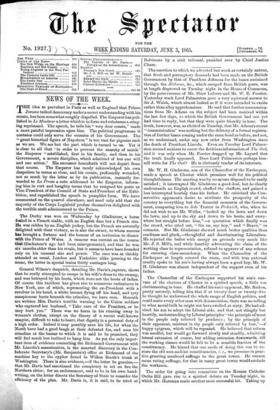The Chancellor of the Exchequer supported his son's can- vass
of the electors of Chester in a spirited speech, a little too electioneering in tone. He chaffed his son's opponent, Mr. Raikes, pretty severely, telling him that if at twenty-four or twenty-five he thought he understood the whole range of English politics, and could smite every other man with denunciation, there was no telling to what moral bulk he might not have swelled at sixty. He had ad- vised his son to adopt the Liberal side, and that not stingily but heartily, understanding by Liberal principles "the principle of trust in the people only relieved by prudence ; by the principle of their opponent, mistrust in the people only relieved by fear,"--te, happy epigram, which will be repeated. He believed that reform was needful, but would go forward slowly and steadily, admitting lateral extension of course, but adding extension downwards, till the working classes would be felt to be a sensible fraction of the constituency. He hinted that one mode of doing this was to re- store the old scot-and-lot constituencies, i. e., we presume in prac- tice granting manhood suffrage to the great towns. He cannot mean rating suffrage, for that in many great towns would exclude the workmen.






























